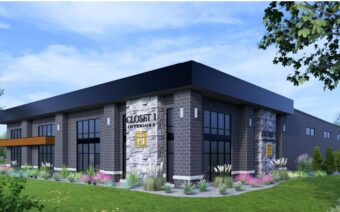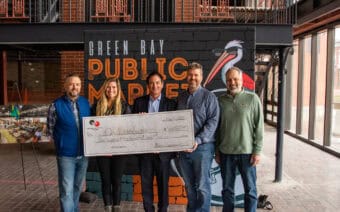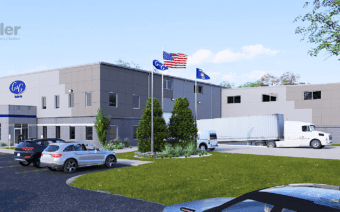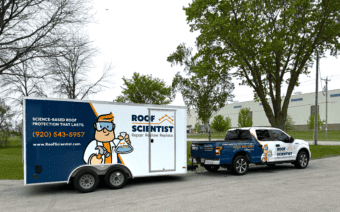
November 2, 2023
NORTHEAST WISCONSIN – According to Larry Bender, current president of Tri City Glass & Door, the data shows that employee-owned companies are more likely to stay in business and less likely to make layoffs during recessions.
Which, he said, was one of the reasons the company is shifting from a family-owned business to an ESOP (employee stock ownership program) – a plan many years in the making.
Bender, 59, said when he retires in March 2024, Tri City, a Northeast Wisconsin residential, commercial and auto glass repair and installation company – which has locations in Appleton (2801 N. Roemer Road) and Green Bay (1811 E. Mason St.) – will transition to a 100% employee-owned company.
Bender said Ryan Hartman, the company’s current director of finance at Tri City, will take over as president.
“This has been in the works since 2015 – that was the first year the family, when they started retiring, began converting their shares to the ESOP and the ESOP began buying out the shares,” Hartman said. “This will be the last piece of the puzzle to go from family-owned to 100% employee-owned.”
Hartman said there are several advantages of an ESOP, including:
It gives workers ownership interest in the company in the form of shares of stock.Employee effort, performance can translate into financial rewardsCan help staff feel more appreciated and better compensated for the work they doGives employees rights to employer-provided assets over time
“It’s another retirement benefit that employees don’t have to invest any money into,” he said. “Based on their hours and wages earned, the shares they own get valued once per year.”
From there, Hartman said, employees retire with the number of shares they’ve accrued over their tenure at the stock price it’s at.
“They can get paid out in a lump sum or over five years, depending on their share balance,” he said. “It’s basically another glorified retirement plan governed like a 401k plan. It’s all through their hard work and the growth and profits of the company.”
Hartman said the ESOP program has been “very popular among Tri City’s employees.”

Ryan Hartman
“You’re enrolled in the plan after a year of service and 1,000 hours,” he said. “That year of service counts in your vesting schedule. The employee vests over some time and becomes 100% vested in the plan like you would in a 401k plan.”
ESOP behind-the-scenes
Bender – whose parents Richard and Shirley started Tri City in 1960 – said though the ESOP transition steps started in 2015, talks about the plan began well before then.
“Discussions probably began five or 10 years before that,” he said. “Some companies might be reluctant to do an ESOP because it’s non-traditional and there’s a bit more financial burden on the company upfront. Essentially, the financing is done through the company to buy the shares, which then get released to the ESOP.”
Bender said this differs from a traditional exit plan.
“That’s usually done through an influx of cash with no debt to the company,” he said. “For that reason, not every company or organization is in a good position to go the ESOP route. An ESOP plan is done over time, whereas the traditional means of selling a business might be easier and quicker.”
Another advantage of an ESOP, Bender said, is “it maintains a company’s culture and employees.”
“With an outside acquisition or merger, there’s typically an outside group that might insert its people into certain positions,” he said. “There are no guarantees with an outside company coming in.”
A homegrown beginning
Bender said Tri City Glass was a home-based operation in his parents’ Fox Valley home for its first 16 years.
“In 1976, they moved operations to the north side of Appleton,” he said. “From there, there was substantial growth. Even in middle school, I worked at the first store location. I would clean up, work on windows, etc.”
In 1986, Tri City added its second location in Green Bay.
Ownership of Tri City was transferred to Richard and Shirley’s four kids – Charles, Donna, JoAnn and Larry – in 1992.
“My brother retired in 2011, JoAnn retired in 2015 and Donna retired in 2019,” Bender said. “When JoAnn retired in 2015, the ESOP was 30%. It went up to 43% when Donna retired.”
Bender said when he thinks about his retirement, he gets a bit emotional.

Tri City Glass & Door specializes in residential, commercial and auto glass repair and installation. Submitted Photo
“The thought of me being the last family member in the business is the emotional part,” he said. “The ESOP will allow the family to leave a lasting legacy in what our parents started. There’s been a lot of planning and prep put into that. Retiring is bittersweet – I’m ready to retire … the letting go aspect of it is a bit hard at times. I think that’s common with a lot of business owners, but I’m excited about the future of Tri City. Ryan has a great ability to lead the company into the future.”
The future
When Hartman takes the reins as president in March, he said the biggest change with Tri City will be continuing to move forward with newer technology.
“It will help us manage our projects better,” he said. “We’d like to get rid of as much paper as possible.”
Hartman said it’s also about growth.
“We’re looking to grow even more,” he said. “We grew 17% this year, and we’re looking to stay on that trajectory to grow somewhere between 15-20% yearly. We’re trying to maximize that stock price for the employees and bring value to them.”
Tri City currently has 140 employees, Hartman said.
“Of those, 135 are full-time and five are part-timers,” he said.
For more information on Tri City Glass & Door, visit tricityglass-door.com.
 Oshkosh Celebration of Lights + EAA = Win-win partnership
Oshkosh Celebration of Lights + EAA = Win-win partnership Venture Ag Drones ‘takes flight’ in Langlade County
Venture Ag Drones ‘takes flight’ in Langlade County








